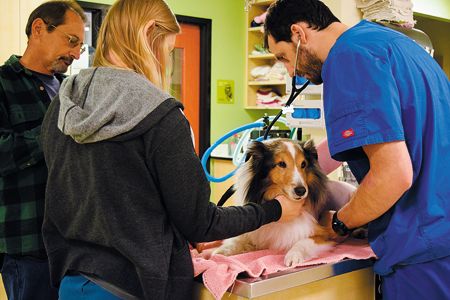Last-minute snuggle spares Ollie the sheltie from euthanasia
Emergency veterinary team in Portland, Oregon, diagnoses tick paralysis just before dog is put down.

After doctors removed an offending tick from Ollie, they gave him a complete body shave to make sure he didn't have any other ticks hidden in his fur. Photos courtesy of DoveLewis Emergency Animal Hospital.A baffling, sudden illness that almost ended tragically for Ollie the sheltie had a happy ending, thanks to a last-minute discovery by an extern at DoveLewis Emergency Animal Hospital in Portland, Oregon.
The 10-year-old sheltie was in good health when he was suddenly struck by a degenerative paralysis that progressed over the course of a week. His owners worked with their regular veterinarian, spending over $1,500 on diagnostics and medications to no avail. Ollie couldn't walk, urinate or defecate on his own, and his owners even had to visit the veterinarian to have his bladder drained. Nothing seemed to help.

Dr. Adam Stone of DoveLewis with his dog, Durban.“They felt that the only option was euthanasia,” says Adam Stone, VMD, an intern at DoveLewis.
DoveLewis offers free euthanasia for clients who've exhausted their resources and are seeking a peaceful end to pet suffering.
“When owners come to us at that point, they've often made their decision. We have to walk a fine line between grilling them and allowing them to peacefully help the animal move on,” says Stone. But in Ollie's case, Stone felt he had to ask a few more questions than usual. “What struck me as odd was that it was degenerative, and it was getting worse with every day that passed.”
Typically, degenerative conditions progress over a much longer period, Stone says. Acute trauma had been ruled out, but there was something that stood out to Stone in the initial assessment.
“We found out that they had been on a hunting trip a few weeks prior. An extern was petting the dog, and that's when we found the tick,” Stone says. “We pulled it off and I instantly thought of tick paralysis.”
Hoping the dog's owners would trust him to give his theory a shot, Stone says he convinced them to give Ollie a little more time.
“They had been coming to terms with it for almost a week at that point,” he says. “I was glad that they took another shot at it.”
The longhaired Ollie was shaved and his bladder was emptied. No other ticks were found, and they sent Ollie home. The next morning-just 10 hours after the tick was removed-Ollie's owners awoke to the sound of his nails clicking across the floor as he beckoned them to let him outside to urinate on his own.
They brought Ollie in to visit DoveLewis later that day, and Stone says it was a relief to see him recover so well and so quickly.
“It's always nice to find a single medication or quick fix to what seems to be a deadly condition,” Stone says.
Tick paralysis is a rare condition caused by a buildup of a neurotoxin emitted in the saliva of certain species of female ticks, Stone says. The neurotoxin prevents nerves from activating muscles throughout the body but usually dissipates within 12 to 72 hours once the tick is removed.
“A lot of people think it's Lyme disease but it's not,” says Stone, adding that Ollie had been on a tick preventive and had been tested during initial diagnostics for tick-borne illness.

Owner Al Meteney (left), extern Neena Golden and Dr. Adam Stone check out Ollie after his near-miraculous recovery.
Stone says this case is a reminder than no tick preventive is completely effective and that multiple treatments should be used in areas prone to heavy tick populations.
“This dog had actually been treated with tick medication,” Stone says. “No medication is going to kill 100 percent of ticks. I recommend animals in rural areas or going hunting use multi-modalities, like a topical plus a flea and tick collar.”
Rachael Zimlich is a freelance writer in Cleveland, Ohio, and a former news reporter for dvm360.